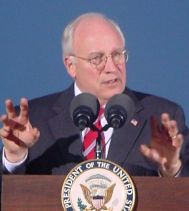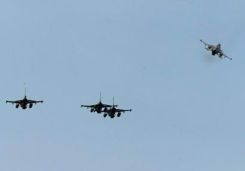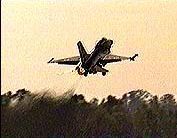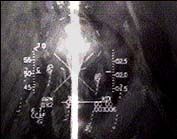
|
NEDERLANDS | ENGLISH
|
|
|
14 december 2005
|
 mail dit artikel
| mail dit artikel
|
 print
| print
|  
Dit artikel is deel van de serie: De komende oorlog tegen Iran
[ 1 - 2 - 3 - 4 - 5 - 6 - 7 - 8 - 9 - 10 - 11 - 12 - 13 - 14 - 15 - 16 - 17 - 18 - 19 - 20 - 21 - 22 - 23 - 24 - 25 - 26 - 27 - 28 - 29 - 30 - 31 - 32 - 33 - 34 - 35 - 36 - 37 - 38 - 39 - 40 - 41 - 42 - 43 - 44 - 45 ]
The coming war against Iran - Part 6
Preemptive nuclear strike, spring 2006?
By Daan de Wit
As we have illustrated in the preceding five parts of this series, the U.S., Israel and Britain are getting ready for an attack on Iran - a preemptive nuclear attack, if the U.S. gets its way. Premier Sharon of Israel is adding fuel to the fire: 'ISRAEL'S armed forces have been ordered by Ariel Sharon, the prime minister, to be ready by the end of March for possible strikes on secret uranium enrichment sites in Iran, military sources have revealed', reports The Sunday Times. And the US midterm elections are becoming important at that time in the U.S. Plus, as a number of specialists in this DeepJournal contend, a war with Iran would not turn out bad at all for the Republican Party. The Dutch in the original article has been translated into English by Ben Kearney. The Sunday Times continues: '[...] Sources inside special forces command confirmed that “G” readiness — the highest stage — for an operation was announced last week'. Israel denies that these plans exist. The Sunday Times also takes into account the rhetoric relative to the Israeli elections: 'The date set for possible Israeli strikes on Iran also coincides with Israel's general election on March 28, prompting speculation that Sharon may be sabre-rattling for votes.' Iran still far from developing nuclear weapon The Washington Post reported in September: 'A recent U.S. intelligence estimate [...] judged Iran to be as much as a decade away from being able to manufacture the fissile material necessary for a nuclear explosion. A report issued last week by the International Institute for Security  Studies, a London-based research group, found Iran was 10 to 15 years from the technical know-how to build a bomb.' Bush, Sharon and Blair are nevertheless screaming bloody murder. In 2002 The London Times reported: '[...] Sharon [...] considers that Iran is a "centre of world terror", and that as soon as an Iraq conflict is concluded, he will push for Iran to be at the top of the "to do" list [...]'. And this month Reuters noted: '"Israel, and not only Israel, cannot accept a situation in which Iran has nuclear weapons," Sharon told reporters. "We are also taking all the necessary preparations to be ready for this kind of situation."' 'Teheran would not be allowed to become a "threat to our world security"', according to Tony Blair. 'Asked whether Mr Blair was making a veiled threat of military action, a senior government source replied: "The prime minister didn't use the 'M' word - but he is making clear that we have to think about these things very seriously indeed."' Studies, a London-based research group, found Iran was 10 to 15 years from the technical know-how to build a bomb.' Bush, Sharon and Blair are nevertheless screaming bloody murder. In 2002 The London Times reported: '[...] Sharon [...] considers that Iran is a "centre of world terror", and that as soon as an Iraq conflict is concluded, he will push for Iran to be at the top of the "to do" list [...]'. And this month Reuters noted: '"Israel, and not only Israel, cannot accept a situation in which Iran has nuclear weapons," Sharon told reporters. "We are also taking all the necessary preparations to be ready for this kind of situation."' 'Teheran would not be allowed to become a "threat to our world security"', according to Tony Blair. 'Asked whether Mr Blair was making a veiled threat of military action, a senior government source replied: "The prime minister didn't use the 'M' word - but he is making clear that we have to think about these things very seriously indeed."' Rumors of war against Iran in spring 2006 In September The Telegraph (India) reported: 'Top-ranking Americans have told equally top-ranking Indians in recent weeks that the US has plans to invade Iran before Bush's term ends. In 2002, a year before the US invaded Iraq, high-ranking Americans had similarly shared their definitive vision of a post-Saddam Iraq, making it clear that they would change the regime in Baghdad.' 'In a season of discontent for the White House, Tuesday's election results intensified Republican anxiety that next year's midterm contests could bring  serious losses unless George W. Bush finds a way to turn around his presidency and shore up support among disaffected, moderate swing voters', reported The Washington Post almost two months later. Author Dan Plesch also sees the period around the midterm elections as a strong possibility: 'For US domestic political purposes a “crisis” in spring 2006 when the EU and the UN can once more be confronted with their alleged failures, and challenged to support US leadership, would be timely for mid-term elections in which the ultra-conservative coalition will wish to consolidate its gains and eliminate any nascent moderate or realistic Republican candidate in good time for the 2008 presidential election.' 'As for the succession to President Bush, Bob Woodward has named Mr Cheney as a likely candidate, a step that would be easier in a wartime atmosphere', writes Plesch in another article. Then in the meantime President Cheney can - after Iran - set his sights on Syria and North Korea and (according to statements made by Plesch during a debate on whether a war with Iran could potentially be near at hand, held last Saturday in Amsterdam) China. Plesch said (and earlier wrote) during his presentation that the 'US strategy is to prevent any state being able to deter it as did the USSR'. For him this means that it is now Iran's turn, and later it will be China's. serious losses unless George W. Bush finds a way to turn around his presidency and shore up support among disaffected, moderate swing voters', reported The Washington Post almost two months later. Author Dan Plesch also sees the period around the midterm elections as a strong possibility: 'For US domestic political purposes a “crisis” in spring 2006 when the EU and the UN can once more be confronted with their alleged failures, and challenged to support US leadership, would be timely for mid-term elections in which the ultra-conservative coalition will wish to consolidate its gains and eliminate any nascent moderate or realistic Republican candidate in good time for the 2008 presidential election.' 'As for the succession to President Bush, Bob Woodward has named Mr Cheney as a likely candidate, a step that would be easier in a wartime atmosphere', writes Plesch in another article. Then in the meantime President Cheney can - after Iran - set his sights on Syria and North Korea and (according to statements made by Plesch during a debate on whether a war with Iran could potentially be near at hand, held last Saturday in Amsterdam) China. Plesch said (and earlier wrote) during his presentation that the 'US strategy is to prevent any state being able to deter it as did the USSR'. For him this means that it is now Iran's turn, and later it will be China's. U.N. Security Council - just as with Iraq - a formality Earlier discussions between Europe and Iran over the nuclear energy program became deadlocked in August. 'Talks have been tentatively scheduled for December 21, but Iranian leaders have dismissed in advance an EU-backed proposal for its uranium to be purified in Russia as "a failed idea"', reported Reuters. At the same time the Iranians are goading the Americans on: 'Iran will allow one of its fiercest critics, the United States, to bid on the construction of a nuclear plant [...]', reported CNN. France and England have already declined an offer to bid on the plant. The headline of the Reuters article says  it all: 'Iran's tough nuclear stance dims hope for talks'. What if, by way of all this quarrelling, Iran gets summoned before the Security Council? Professor Jorge E. Hirsch takes a peek into the future when he writes: '[...] when Iran's case comes before the SC [Security Council] and no sanctions are passed due to Russia's and China's vetoes, the U.S. will be left with no diplomatic options – not a desirable position to be in, unless the purpose all along was to resort to a military option.' In another article Hirsch writes: 'Military action will occur before Russia ships uranium fuel to Iran, and will inevitably lead to the use of nuclear weapons by the U.S. against Iran. How will it all get started? No matter how much Bush and Cheney want it, the U.S. Senate is unlikely to authorize the bombing of Iranian installations out of the blue. Unless there is some major disturbance in Iraq that can be blamed on Iran, Israel is likely to pull the trigger. It knows how to and has every motivation to do so.' it all: 'Iran's tough nuclear stance dims hope for talks'. What if, by way of all this quarrelling, Iran gets summoned before the Security Council? Professor Jorge E. Hirsch takes a peek into the future when he writes: '[...] when Iran's case comes before the SC [Security Council] and no sanctions are passed due to Russia's and China's vetoes, the U.S. will be left with no diplomatic options – not a desirable position to be in, unless the purpose all along was to resort to a military option.' In another article Hirsch writes: 'Military action will occur before Russia ships uranium fuel to Iran, and will inevitably lead to the use of nuclear weapons by the U.S. against Iran. How will it all get started? No matter how much Bush and Cheney want it, the U.S. Senate is unlikely to authorize the bombing of Iranian installations out of the blue. Unless there is some major disturbance in Iraq that can be blamed on Iran, Israel is likely to pull the trigger. It knows how to and has every motivation to do so.'Possible cooperation between U.S. and Israel to stage attack Hirsch's prediction calls to mind statements by Dick Cheney from the beginning of this year, in which he outlined these steps exactly: European diplomacy, Iran before Security Council, sanctions, an Israeli attack. Cheney: 'Well, one of the concerns people have is that Israel might do it without being asked, that if, in fact, the Israelis became convinced the Iranians had significant nuclear capability, given the fact that Iran has a stated policy that their objective is the destruction of Israel, the Israelis might well decide to act first, and let the rest of the world worry about cleaning up the diplomatic mess afterwards.' Cheney wouldn't mind too much, since he is putting himself squarely in Israel's corner in advance: '[...] look around the world at potential trouble spots, Iran is right at the top of the list.' The 'major disturbance' (Hirsch) through which Israel 'might well decide to act first' (Cheney) will be launched after a second September 11th, according to author Webster Tarpley. He repeated this last month at the Axis For Peace conference in Brussels during a presentation entitled Stop the Third World War. This is a war arising from the War on Terror, which he feels is based on the myth of September 11th, about which DeepJournal has written extensively. Given the many common interests of the U.S. and Israel it is not unlikely that an old plan will be pulled off the shelf: the torpedoing of Americans  by Israel with the consent of the American government, which will be blamed on the enemy-of-the-day, in this case Iran. This type of plan, resulting in many deaths, has already been carried out via Operation Cyanide. DeepJournal has written on this subject in the Dutch magazine De Humanist. The story in brief: In 1967 the U.S. wanted to become involved in Israel's battle against Egypt, and therefor sacrificed a U.S. Navy vessel that would ostensibly be attacked by Egypt. The ship was actually attacked by unmarked Israeli fighters, torpedoed by Israeli ships and shelled with napalm. Contrary to all expectations, a portion of the crew survived, and the American airplane that was already en route to Egypt in order to avenge the attack with a nuclear bomb was called back. by Israel with the consent of the American government, which will be blamed on the enemy-of-the-day, in this case Iran. This type of plan, resulting in many deaths, has already been carried out via Operation Cyanide. DeepJournal has written on this subject in the Dutch magazine De Humanist. The story in brief: In 1967 the U.S. wanted to become involved in Israel's battle against Egypt, and therefor sacrificed a U.S. Navy vessel that would ostensibly be attacked by Egypt. The ship was actually attacked by unmarked Israeli fighters, torpedoed by Israeli ships and shelled with napalm. Contrary to all expectations, a portion of the crew survived, and the American airplane that was already en route to Egypt in order to avenge the attack with a nuclear bomb was called back. Problems with an attack on Iran - 1
____________________________________________________________________________
DeepJournal Meld je aan voor de gratis mailing list. |
 the importance of the nuclear option for the U.S. is multi-layered. These problems could be partially tackled by the use of small teams of covert Special Forces in place of large troop deployments.
the importance of the nuclear option for the U.S. is multi-layered. These problems could be partially tackled by the use of small teams of covert Special Forces in place of large troop deployments.